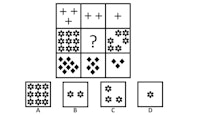The FBI Phase 1 Test – Tips for 2025
All products and services featured are independently selected by WikiJob. When you register or purchase through links on this page, we may earn a commission.
- Why Do Candidates Have to Take the FBI Phase 1 Test?
- What Is Being Assessed On The FBI Phase 1 Test?
- FBI Phase 1 Test Question Formats
empty
empty
empty
empty
empty
- What to Expect When Taking the FBI Phase 1 Test in 2025
- How to Pass the FBI Phase 1 Test in 2025
- What Happens Next in the Application Process?
- Frequently Asked Questions
- Final Thoughts
The FBI Phase 1 Test is a five-part computerized personality assessment designed to assess suitability for a Special Agent role at the FBI.
Candidates are invited to take the test at a regional test center, after successfully completing a written application.
The test assesses critical thinking, logical reasoning as well as personality and background experiences that would make a candidate suitable for work as a special FBI agent.
There are five sections of the FBI Phase 1 Test:
- Logical reasoning
- Figural reasoning
- Personality
- Preferences and interests
- Situational responses
The test takes three hours to complete.
The full special agent recruitment process can take over 20 months, and as it is one of the most attractive career paths within any government agency, this test is tough.
The test has a 30% pass rate, and it is challenging. Not only are the reasoning questions in the first two sections very difficult, but the sections which evaluate personality, preferences and professionalism have no right answers.
The questions are framed differently from other personality tests, making preparation essential but progress hard to evaluate.
If the candidate is successful, they will be invited to a regional meet-and-greet interview, following background checks.
Information on the full application process can be found on fbijobs.gov.
Why Do Candidates Have to Take the FBI Phase 1 Test?
The core values of the FBI include:
- Compassion
- Fairness
- Uncompromising personal and institutional integrity
- Accountability by accepting responsibility for actions and decisions and their consequences
The FBI Phase 1 Test is designed to evaluate these values and weigh them up against a candidate's logical reasoning abilities. It identifies trustworthy candidates, both with high IQs and high emotional awareness.
The test is returned with a pass or fail result within one hour, so it is marked by a computer. By comparing responses from different sections of the test, it will be clear to the algorithm whether or not a candidate is an honest individual.
If a candidate suggests, in the personality section, that they value detail orientation and completing work to a high standard, but, in the situational section, chooses a response that negates this, the test not only demonstrates that the candidate has in effect lied, but that they are, in the wider picture, prepared to withhold or distort information. This goes directly against the core FBI values of integrity and accountability.
The FBI makes it clear that it requires Special Agents from a wide variety of backgrounds with varied skills that can be applied to the range of criminal activities the FBI exists to combat.
So, this test is not a skills test, but a thorough assessment of the personality and psychology required to undertake sensitive national security investigations.
What Is Being Assessed On The FBI Phase 1 Test?
The test assesses the critical thinking capabilities required for a Special Agent role. An FBI agent needs to analyze large quantities of information and extract important information from it.
The logical and figural reasoning tests are subtle, complex questions that evaluate a candidate’s ability to do this quickly and accurately.
- The logical reasoning questions require candidates to extract information from a paragraph of text.
- The figural reasoning tests are visual and require candidates to correctly identify the next logical iteration in a sequence of graphics or images.
The next three sections evaluate personality, attitudes to work quality and teamwork, as well as self-awareness, honesty, and professionalism.
The personality section questions are similar to psychological personality tests. They provide two unrelated statements from opposing personality traits and ask a candidate to choose one. There is no option for a neutral response.
The preferences and interests section describes one attribute of a professional personality trait, for example, “I often put in extra hours to ensure I meet deadlines without omitting to check the details of my work.” and provides a “strongly disagree - Strongly agree” five-point scaled response.
The situational questions section gives a more detailed paragraph that describes a scenario a Special Agent is likely to encounter on a regular day at the FBI, and five different descriptions of responses.
The candidate should choose the one which most closely matches what their response would be.
On close analysis of the practice questions, the test format makes it impossible for any exaggeration of a candidate’s capabilities. The questions of the final three sections are carefully structured to evaluate self-awareness and delve deep into a candidate’s behavioral psychology, and it will be obvious to the computer algorithms used to assess the test if a candidate is lying.
The official test preparation materials emphasize that candidates should not read into the questions or guess what the FBI is looking for, but instead pick responses that accurately reflect who they are.

Practice FBI Phase 1 Test with JobTestPrep
FBI Phase 1 Test Question Formats
Preparation for the FBI Phase 1 Test is important as the formats of some questions are quite different from other professional and academic tests, and require varied approaches.
Logical Questions
There are 11 logical questions on the FBI Phase 1 Test, each comprising a short informational paragraph, a question and five possible answers.
No pen or paper calculations are necessary, and it is important to evaluate the type of statements made in each sentence, to infer the correct answer from the question presented.
The four types of statements made are 'all' statements, 'some' statements, 'if-then' and 'no' statements.
For example:
Statement: All employees in the finance department of a company earn more than 5,000 dollars a month.
An incorrect inference of this sentence would be:
All employees who earn 5,000 dollars per month in an organization work in the finance department.
A correct inference:
Some of the employees in an organization who earn more than 5,000 dollars per month work in the finance department.
Statement: No employees in the finance department of a company take part in the companies human resources activities.
An incorrect inference of this sentence would be:
Some finance department employees take part in human resource activity.
A correct inference:
Some of the employees in the finance department could take part in other activities in the company, but not in human resources.
Statement: Some of the employees in the finance department work more than 50 hours a week.
An incorrect inference of this sentence would be:
Some of the employees in the finance department work less than 50 hours a week.
(This is incorrect, as the rest of the employees may work more than 60 or 70 hours per week)
None of the employees in other departments work 50 hours a week.
A correct inference:
Some of the employees in an organization who work more than 50 hours a week do work in the finance department, but others who work this number of hours or more work in the finance department and elsewhere in the company.
Statement: If employees in the finance department deliver an increase in profits of more than 10%, then they are rewarded with an annual bonus.
An incorrect inference of this sentence would be:
If the employees in the finance department receive an annual bonus, they then increase profits by 10%.
A correct inference:
If the employees in the finance department do not increase sales by 10%, they will not be awarded an annual bonus.
Sample Question
There have been potential terrorism cases identified in a particular state. These cases have been allocated to either Team 1 or Team 2. Cases that are rated as 'low alert' will not be managed by Team 1. Some of the investigations will be managed by Team 1.
Based on the statement, which of the answers MUST be true?
A. Some terrorism investigations rated as low alert are managed by Team 1
B. None of the terrorism cases are rated as low alert
C. Some terrorism cases are not rated as low alert
D. Every terrorism case rated as high alert is managed by Team 1
E. None of the terrorism cases rated as low alert are cases handled by Team 2
In each type of statement, it is important to consider each answer carefully and make the correct inference.
Figural Reasoning Questions
The figural reasoning questions on the FBI Phase 1 Test assess your ability to problem solve by providing a sequence of pictures or shapes from which the candidate must deduce the next correct image series in the pattern.
There are nine figural reasoning questions included in the FBI Phase 1 Test.
Patterns are laid out in rows and columns and might be present in any aspect of the symbols and shapes, including color, size, linear shape, shading or other elements of the image.

Which answer option can replace the question mark?
If you need to prepare for a number of different employment tests and want to outsmart the competition, choose a Premium Membership from JobTestPrep.
You will get access to three PrepPacks of your choice, from a database that covers all the major test providers and employers and tailored profession packs.
Personality Questions
There are 100 personality questions on the FBI Phase 1 Test.
Each question asks the candidate to choose between two opposing descriptions of a personal characteristic that are unrelated.
The test delivers a set of five questions, after which a new set appears. The test is adaptive – the subsequent questions presented will depend on the candidate’s answer to the previous.
In this section, there are no right or wrong answers, and it is important to be honest and not read into or anticipate what the FBI is looking for in a candidate whilst considering each statement.
The integrity of your answers is likely to be compared to answers in the 'preferences and interest' and 'situational response' sections.
The number of questions suggests that they should be answered with an almost immediate response, instead of a considered weigh up of the question’s implications.
Each statement can be answered with a 'strongly agree', 'agree', 'disagree' or 'strongly disagree' response, displayed on a sliding scale. There is no option for a neutral response.
Example Question
| I enjoy helping others | strongly disagree | disagree | agree | strongly agree | I give extra time to my work to meet deadlines |
|---|---|---|---|---|---|
| I finish tasks on time even if they included a mistake or two | strongly disagree | disagree | agree | strongly agree | If I disagree with someone I will let them know immediately |
| If someone's opinions are different from mine I respect them even if they disagree or argue with me | strongly disagree | disagree | agree | strongly agree | I am motivated to make progress as a professional |
There are no right or wrong answers to these questions. They assess whether a candidate is intuitive or strategic in their approach to work, and thinking or feeling in the way they approach people.
They also assess what is more important to a candidate: making strong working relationships or focusing on providing high-quality work output.
Preferences and Interests
Although similar to the personality questions, the preferences and interests questions on the FBI Phase 1 Test are designed to assess the dispositional qualities of a candidate required for the role of a Special Agent.
There are 37 questions in this section of the test.
It is important not to overthink these questions or read into what the FBI might be looking for by asking them. The candidate should instead choose the response which is most accurate to their response to similar situations, drawing on reflections from their own professional lives.
These questions are focused on attitudes to work, time management, detail orientation and career progression, rather than personality traits and general dispositions.
Example Questions
When working in a team, it’s more important to ensure the work product exceeds expectations than it is to make sure everyone is doing the same amount of work.
A. Strongly Agree
B. Agree
C. Neither Agree nor Disagree
D. Disagree
E. Strongly Disagree
When working as part of a team, it is more important to me that everyone pitches in with the same amount of work than for me to ensure the work meets expectations and contains no mistakes.
A. Strongly Agree
B. Agree
C. Neither Agree nor Disagree
D. Disagree
E. Strongly Disagree
Situational Judgement
There are 19 questions in the situational judgment section of the FBI Phase 1 Test.
Each question details a workplace scenario that a special agent might ordinarily encounter in their day-to-day work, with five different detailed responses as answers.
Candidates should not linger on answers or read into what the FBI is looking for, but instead choose the answer which most closely reflects the way they have responded to experiences in the workplace in their careers so far.
These questions assess a candidate's career values. They evaluate whether learning, networking, gaining status or producing high-quality work are the candidate’s priorities.
Example Question
There is a mix of initiatives within your organization managed by different teams. Your manager would like you gain experience in other parts of the organization and has offered you the opportunity to choose a project which you would like to work on with another team, whilst still working on your existing projects with the same workload.
Which of the following options are you most likely to select?
A. Select the project which involves the most senior members of your organization to make a strong impression.
B. Choose the project which is tackling the issue which is most important to you.
C. Ask to join a project at another time so you can focus on your current work.
D. Choose the project which you can be least involved in so it disrupts your assignments less.
E. Choose the team which is least involved with your current team to grow your professional network.
What to Expect When Taking the FBI Phase 1 Test in 2025
The tests are administered at local testing sites by PSI services (PSI) who are not affiliated with the FBI. They are delivered by proctors who are unaware of the test content and cannot offer help with the test whilst it is being undertaken.
Once you have been offered the opportunity to take the FBI Phase 1 Test, you have a small time frame of 21 days from invitation to schedule and complete the test.
Candidates should bring a driving license or another form of official photographic ID to the testing center. You must not bring anything else into the test center, including backpacks, bags or purses, pens or pencils. No paper calculations are allowed during the test.
You are not allowed to use the bathroom during testing, so ensure you are prepared for this. You should wear comfortable, casual clothing and dress with layers, as different testing centers may be cooler or hotter.
You must not discuss the test with anyone before, during or after the test.
How to Pass the FBI Phase 1 Test in 2025
Step 1. Be Honest
The test exists to evaluate the characteristics, dispositions and professional attitudes a Special Agent needs. Not only this, the FBI has carefully structured the tests to evaluate integrity.
There is no point saying in one section that you always pay attention to detail in your work and in other questions demonstrate that you lose motivation when you have to pay attention to detail for long periods.
Any inconsistency will betray a lack of honesty and integrity, and lose you the chance to be invited to the Phase 2 Test and interview.
Step 2. Take Time on the Logical and Figural Reasoning Sections, and Be Intuitive and Responsive on the Rest
The first two parts of the test evaluate your ability to analyze and deduce correct answers from complex sets of information. The final three sections deeply analyze your behavioral psychology.
Therefore, spend time getting the answers right in the first two sections, but do not overthink the final three and ensure they demonstrate who you truly are as a professional.
Step 3. Practice
Although there are no right and wrong answers in three of the five sections of the FBI Phase 1 Test, familiarity with the question formats will be essential to success.
The question formats are unusual, and without having undertaken practice tests, you are likely to make mistakes in the first sections and misinterpret the purpose of the final sections of the test.
Practicing will also increase your self-awareness by encouraging you to reflect on your professional progress and motivations in your career to date, allowing you to give more accurate and honest answers to the personality assessment.
Step 4. Read the FBI Official Information Thoroughly
The FBI detail their values and mission in a detailed document on how to apply for a role as a Special Agent.
However, they do not disclose any information about what they are looking for in official advice. Indeed, in terms of professional skills, they are seeking a diverse workforce who use their skills to approach a very wide variety of criminal problems, including terrorism, human trafficking, cybercrime and white-collar criminal activity.
Reflect on how your professional experiences and skills make you a strong candidate for the role of a Special Agent.
What Happens Next in the Application Process?
The full SASS admission process can take more than a year to complete.
After the FBI Phase 1 Test is submitted, candidates will receive a pass or fail result within one hour.
If a candidate is successful, they will be notified of the process for submitting the required information documents. These include critical skills, Special Agent Physical Fitness Test (SA PFT) self-evaluation and self-reported language sections.
After this, candidates are invited to a meet and greet interview at a regional office, and if they pass they will be invited to undertake the Phase 2 written test and in-person interview with a special panel.
The average timeframe for moving to Phase 2 is 23 weeks.
Frequently Asked Questions
Yes. The FBI Phase 1 test has a 30% pass rate, so it is considered to be a challenging assessment. Test-takers must answer two sets of difficult reasoning questions. This is followed by a series of personality, preferences and professionalism questions, which have no right or wrong answers. The format of the test is different to other personality tests, so it can be difficult to track progress during the preparation stage.
The best way to prepare for the FBI exam is to practice. This helps to ensure you are familiar with the format of the questions, meaning you will feel confident on the day of the test.
Answering practice questions is a good way to reflect on your personality, preferences and professionalism, allowing you to give more accurate, honest answers during the personality assessment.
You will find many FBI exam preparation resources online – we recommend JobTestPrep for a comprehensive FBI exam preparation package.
The FBI Phase 1 test is split into five sections: logical reasoning, figural reasoning, personality, preferences/interests and situational responses.
This computerized personality test uses multiple-choice questions to assess suitability for the role of FBI Special Agent.
You will receive a pass/fail notification within one hour of completing the test. If you pass, you’ll be invited to attend a Meet and Greet session with your Processing Field Officer (PFO).
This will depend on which job role you want to apply for. If you want to become a special agent, you will need to have a college degree and at least three years of continuous work experience.
If you have an advanced degree, this is reduced to two years of continuous work experience.
For other roles within the FBI, you can apply right out of college.
If you fail FBI Phase 1 test on the first attempt, you will be able to resit the test 90 days later. If you fail the test again on your second attempt, your application for the position of Special Agent will be deactivated permanently.
Just 30% of people pass the FBI Phase 1 test.
The application process for the position of FBI special agent is extremely competitive. Only around 3% of FBI applicants are accepted to the FBI special agent training academy.
Final Thoughts
The application process for the FBI is designed to recruit elite individuals. It is a mentally and physically challenging process that will absorb a lot of energy and focus.
The test is unusual in that it evaluates honesty and integrity as well as personality traits and mental faculties in logic and reasoning. Because the FBI gives away very little around what they are looking for in candidates, the only way to pass the test is to be fully honest with yourself, reflect on your professional experience, and be accurate and considered in the way you approach the logical and figural reasoning questions.
The differences in answers to the situational questions are very subtle, so step back and consider what is important to you and what your core professional values and priorities are.
With a one-hour turn around for results, the tests are marked by complex computer algorithms that evaluate personality. There is no empathy from a human assessor in the way the tests are marked, and in-person assessment and evaluation come at a later stage of the interview process.
Manage your time carefully during the test. Once a section is completed it cannot be revisited or amended.



